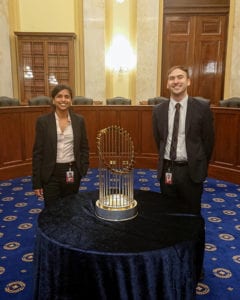Posted by: Samata (Sammy) Katta, PhD, Genetics & Public Policy Fellow

As the ASHG/NHGRI Genetics & Public Policy Fellow for 2019-2020, I’ve completed my first rotation at the National Human Genome Research Institute and have recently started my second rotation on Capitol Hill. I’ve been working with the Health, Education, Labor, and Pensions (HELP) Committee, where I found a place with the committee staff under Ranking Member Patty Murray.
The most fascinating thing I’ve learned about the Senate so far is just how much business gets done through unanimous consent. Where I expected to see constant, contentious debate on the floor, I instead found much of the discussion and negotiation happening in office buildings, in meetings between staff, and in exchange after exchange of draft language that I was now becoming privy to. Where I anticipated close, party-line votes on every bill, I learned that only a minority of bills actually make it to a vote without unanimous consent (even leaving aside the less-controversial resolutions and post-office-naming bills).
Working on Historic and Day to Day Issues
My first few weeks were actually closer to what I’d expected, with the impeachment trial. Working in a Senate office meant I had the opportunity to sit in the staff gallery for a few hours during the historic event and watch the House managers speak (though I watched the vast majority of the trial on TV like everyone else).
During that time, there were no scheduled committee hearings, no markups of legislation that could then be reported out of committee and sent to the floor for a vote. While we did some long-term work and prepared for business to start again, I was able to take advantage of classes from the Congressional Research Service to learn how the Senate works, explore resources, and get a crash course in the hot topics before Congress this year.
Over the past month, my main issue areas have been mental health, women’s health, and biomedical research, and I’ve been working with staffers who focus on those areas. I’ve met with constituents and advocacy groups to hear their asks and share what the Senator is working on. I’ve written memos for senior staff, analyzed bills that have been referred to the committee, and helped negotiate changes in the language with our counterparts across the aisle. Though we certainly have differences on a number of issues, it’s been clear that there really is bipartisan support for biomedical research as a whole, and a willingness in this area to find compromises that work for both parties.
Having already completed a rotation in the Executive Branch, I’m now experiencing a process I knew even less about – how Congress interacts with executive agencies – from the other side. I’ve helped draft letters from the Senator to agencies to ensure they’re doing what the law requires or to criticize policies that might not do what they say. I’ve called agencies to get their expert input on bills we’re working on, and conversely, sat on the NIH side of similar calls – sometimes even on the same issue! I’ve heard from patient advocacy groups about particular programs they’d like the Senator to fund (in her other role as Ranking Member of the Appropriations Committee that oversees NIH), and I’ve also written parts of NHGRI’s budget justification, describing the progress and achievements of previously funded programs for Congress.
Strengthening My Understanding of the System
It’s clear to me that my scientific experience, my rotation at NHGRI, and my time with HELP Committee are already helping me form a more nuanced understanding of how NIH works, and of the complex relationships between scientists, advocates, the agency, and Congress. My knowledge base is also expanding to include policy around the healthcare payment system, the opioid crisis, maternal mortality, public health (yes, including a little bit about coronavirus), and much more.
In all my rotations so far, I’ve been given plenty of responsibility and autonomy, with the expectation that my PhD has taught me how to break down my goals into manageable tasks and find the resources I need to get them done. At the same time, I haven’t been left completely to my own devices – my mentors from the fellowship and the committee staff have been great resources themselves and helped guide me as I make my way into this new world of policy.
Applications for the 2020-21 Genetics & Public Policy Fellowship are open now, through April 10. This is honestly a fantastic opportunity for any early career scientist or genetic counselor who is interested in working in policy to really see how all the cogs fit together, explore a variety of policy careers, and apply all the skills they’ve learned during their career to make a difference for the country.
